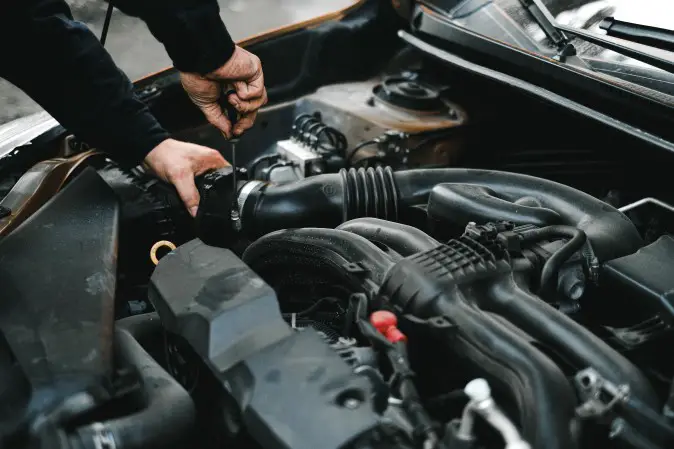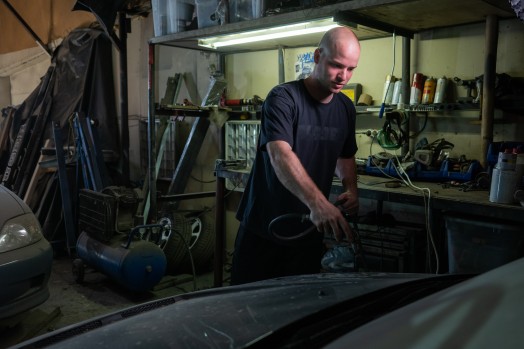Few parts of the world of automobile engineering inspire as much respect and appreciation as the V8 engine. Admired for its strength, efficiency, and distinctive growl, the V8 engine is a symbol of engineering mastery and has long been a mainstay of outstanding automobile design. But dependability is a crucial characteristic that separates the best V8 engines from the others, even above mere power, and tone.
Evolution of V8 Engines:
The development of V8 engines is a fascinating voyage through the history of automobiles, characterized by advances in technology, creative engineering, and a never-ending pursuit of efficiency and power. Early 20th-century automotive ingenuity and experimentation gave rise to the development of V8 engines as engineers looked to create small yet powerful powerplants.
V8 engines were initially simple, with cast-iron blocks and frequently side-valve designs. In this evolutionary timeline, the Ford Flathead V8, which debuted in the 1930s, represents a crucial turning point. It was the first mass-produced V8 engine and brought increased power and accessibility to the public, impacting the mobile industry.

The development of V8 engines was fueled by improvements in manufacturing processes, materials science, and design concepts. After World War II, there was a technical advancement boom in the sector. Improved metallurgy, overhead valve designs, and aluminum alloys made it possible to create V8 engines that were stronger, lighter, and longer lasting.
As rules and customer needs changed, V8 engines saw considerable improvements in fuel efficiency and pollution management in the years that followed. Electronic fuel injection, variable valve timing, and cylinder deactivation technologies were introduced due to these advancements, guaranteeing power and dependability but also improved fuel efficiency and a smaller environmental effect.
Key Factors Contributing to V8 Engine Reliability:
The durability and dependability of V8 engines are supported by many crucial elements that work in concert to provide their reliability:
- Engine Design and Construction: The reliability of V8 engines is dependent on their basic design. Robust blocks, effective cooling systems, and thoughtful component placement are examples of well-thought-out designs that guarantee endurance and resilience under a variety of circumstances. Reliability is enhanced by the V8 architecture itself, which has a balanced power delivery and less stress on individual parts than other engine layouts.
- Quality of Materials and Manufacturing: The dependability of V8 engines is dependent on the materials used in their construction. Producing long-lasting engines requires exact machining, premium metals, and strict production guidelines. High-quality materials help the engine endure wear and strain over time, improving performance and extending its dependability.
- Maintenance and Longevity Considerations: Maintaining V8 engines regularly is essential to their durability and dependability. Maintaining the engine’s health requires regular filter changes, enough oil changes, and adherence to the manufacturer’s suggested service schedules. Through the prevention of early wear and probable failures, proper maintenance prolongs the engine’s life and upholds its dependability.
- Testing and Validation Processes: Ensuring the dependability of V8 engines throughout development and manufacturing requires rigorous testing and validation procedures. The best way to find and fix any flaws or failure areas in an engine before it is delivered to the customer is to simulate different operating circumstances, stress test individual parts, and implement quality control procedures. These exacting procedures contribute to the development of reliable and sturdy powertrains.
- Integration of Advanced Technologies: The dependability of V8 engines has been increased by the integration of modern technology. In addition to enhancing performance, features like smart sensors, variable valve timing, precise fuel injection, and electronic engine management systems also help to increase efficiency and dependability. Thanks to these technical advancements, V8 engines can operate and function optimally under varying situations.

Top Reliable V8 Engines:
Numerous V8 engines have garnered recognition for their remarkable dependability, durable efficiency, and noteworthy influence on the automobile sector. Some of the best dependable V8 engines are listed below:
- Chevrolet Small Block V8: This legendary engine is well known for its durability and dependability. Since its introduction in 1955, it has been a standard feature on many Chevrolet cars. Car fans love it because of its versatile design, sturdy build, and adaptability to many uses. Reliability is enhanced by the Small Block V8’s easy maintenance and reputation for reliable power output.
- Ford Modular V8: Ford’s Modular V8 engine family has had a long-lasting effect on the car industry. These engines, which come in versions including the 4.6L and 5.4L, are praised for their durability and adaptability. Their architecture, which combines modular construction and overhead camshafts, offers a broad variety of Ford vehicles with a power-to-reliability ratio.
- Toyota 1UZ-FE V8: The Toyota 1UZ-FE V8 engine became well-known for its remarkable longevity and dependability when it was used to power many Lexus vehicles. It has a reputation for endurance and reliable performance thanks to its sturdy construction, careful engineering, and thoughtful design.
- Mercedes-Benz M156 V8: This high-performance engine blends dependability and power; it is available in AMG vehicles. The M156 V8 engine is well regarded for its superb engineering, which combines impressive performance with a degree of longevity and dependability exclusive to Mercedes-Benz. Within the world of premium performance cars, its reputation for dependability is due to its creative design and painstaking production.
Innovations and Future of V8 Engines:
Innovations in V8 Engines:
There has been a constant stream of innovation into V8 engines to improve efficiency and performance. Among the major developments are:
- Hybridization and Cylinder Deactivation: Cylinder deactivation technology is being used by manufacturers to increase fuel economy. Thanks to this breakthrough, V8 engines may now run like smaller engines by turning off cylinders when there is little to no demand, saving fuel. Furthermore, combining hybrid technology with V8 engines is meant to boost production while cutting emissions.
- Direct Injection and Turbocharging: Power output and fuel economy have increased due to greater fuel management and combustion efficiency made possible by direct injection technology. Furthermore, turbocharging V8 engines are becoming increasingly popular since they offer a significant power boost without sacrificing economy.
- Variable Valve Timing and Advanced Engine Management Systems: V8 engines are operating more efficiently because of advanced engine management systems, which improve combustion process control. By varying valve timing for various driving circumstances, variable valve timing technology further improves efficiency and power output.
- Lightweight Materials and Design Optimization: To improve engine efficiency without sacrificing durability, manufacturers are increasingly using lightweight materials like aluminum and high-strength alloys to reduce overall engine weight.

The Future of V8 Engines:
V8 engine development is intricately linked to changing market trends and technological developments.
- Refinement of Efficiency and Power Balance: It is anticipated that V8 engines in the future will keep trying to find the best possible mix of efficiency and power. To further optimize these features, engineering breakthroughs, hybridization, and advancements in combustion technology will be the focus.
- Integration with Electric Powertrains: There is potential for V8 engines to cohabit alongside electric powertrains because of the automobile industry’s transition towards electrification. Electric motors and V8 engines combined in hybrid systems might provide previously unheard-of power and efficiency while adhering to environmental regulations.
- Enhanced Connectivity and Smart Features: Future V8 engines are going to be a part of smart car ecosystems, with sophisticated connection enabling better diagnostics, predictive maintenance, and more driver-specific performance customization.
Challenges and Controversies:
Even with their remarkable performance and long history, V8 engines face many issues and debates that will affect their continuing significance in the automobile industry. These include:
- Environmental Concerns and Emissions: Because V8 engines have more displacement and power output, they are frequently linked to greater pollutants and fuel consumption. Concerns have been raised about this issue as the vehicle industry works to meet strict emissions requirements and lessen its carbon footprint. V8 engines are under pressure from governments throughout the world to provide cleaner, more fuel-efficient automobiles.
- Shift Towards Electrification and Alternative Power Sources: Alternative energy sources and electric cars are becoming more popular in the automobile sector. Traditional V8 engines are under threat from the growth of electric vehicles, hybrid vehicles, and even hydrogen fuel cell technology since these alternatives have fewer emissions and higher energy efficiency, which are more in line with changing environmental regulations.
- Market Demand and Consumer Preferences: The market for V8 engines is being impacted by shifting customer tastes. Although there is a niche market for high-performance V8 engines among enthusiasts, the public is moving towards smaller, more economical engines that nevertheless deliver sufficient power and are less harmful to the environment.
- Regulatory and Economic Pressures: V8 engines face economic hurdles due to more complex production processes and strict pollution standards. It is sometimes necessary to make significant expenditures on technology and innovation to comply with these requirements, which affects how cost-effective it is to produce standard V8 engines.
Frequently Asked Questions (FAQs):
Who is the best manufacturer of v8 engines?
Deciding who makes the finest V8 engine is a personal choice. Enterprises such as Chevrolet, Ford, Mercedes-AMG, and Lexus are well-known for their V8 engines, which are exceptional in several domains such as dependability, efficiency, and adaptability.
Which V8 engine is most in demand?
Because of their dependability, efficiency, and versatility across several car types, V8 engines from Ford (Modular V8), Mercedes-AMG, and Lexus are among the most sought-after. Other popular manufacturers of V8 engines are Chevrolet (Small Block).
Which V8 is the simplest to work on?
One of the easiest V8 engines to work on is sometimes regarded as the Chevrolet Small Block V8. Compared to some other V8 engines, it is simpler to maintain and modify due to its modular structure, readily available components, and straightforward design.
Does V12 outperform V8?
Because they have more cylinders than V8 engines, V12 engines frequently perform better in terms of power and smoothness. V8 engines, on the other hand, are more useful for a variety of applications as they are more efficient and compact.
Conclusion:
A symbol of strength, performance, and durability, the V8 engine finds itself at a turning point in the dynamic world of automobiles. Its rich tradition is based on a long history of steadfast dependability and unrelenting technical innovation. However, there are chances and difficulties for the V8 engine’s future as the automobile industry navigates a transitional period of environmental concern and technology developments.

